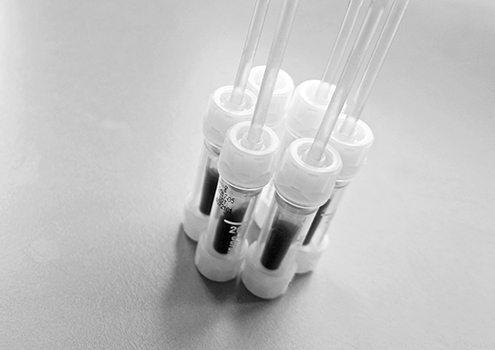Faculty of Medicine researchers have developed a method for testing prostate cancer DNA from a small blood sample, making it possible to retrieve exact information about how the cancer is genetically changing and helping determine the type of treatment best suited to treat it at that moment.
The past five years have seen an explosion in the number of novel therapies for metastatic castration-resistant prostate cancer (mCRPC). One of those drugs, enzalutamide, is part of a class of agents known as androgen receptor inhibitors that have powerful effects on prostate tumours and significantly prolong life expectancy in men with mCRPC. However, patients inevitably become resistant to the drug, for reasons not well understood.
In response to this phenomenon, researchers at UBC, the Vancouver Prostate Center and the BC Cancer Agency sought to develop biomarkers to be able to identify which drugs should be used in a given patient at a given time and to find what exactly is fueling therapy resistance.
“There exists an urgent need to be able to monitor a patient’s cancer in real time and to select the most appropriate treatment option based on the cancer’s genetic make-up,” explains Kim Chi, a Professor in the Division of Medical Oncology and Associate Director of Clinical Research at the Vancouver Prostate Centre.
Previous research has shown that prostate cancers shed a small amount of DNA into the bloodstream and that some DNA changes that are present in a patient’s cancer are therefore detectable in a blood sample. Building on this, the VPC team developed a technique to isolate the cell-free DNA from the blood sample, and also developed a custom sequencing test that gave DNA sequence information only for the genes they sought to investigate.
The researchers demonstrated that clinically-informative genomic profiling allowed for the ability to predict a patient’s response to hormone therapy and was feasible in nearly all mCRPC patients. Their findings were published in the May issue of JAMA Oncology.
Co-author Alexander Wyatt, an Assistant Professor in the Department of Urologic Sciences, credits both the advancement of next-generation sequencing technology and a “revolution” in liquid biopsy for the ability to test tumour DNA via blood sample.
“If you want to develop biomarkers or therapy resistance, you need to look at something from the tumour, but one of the barriers with mCRPC has always been the inability to readily sample tumour tissue in these patients,” Dr. Wyatt says.
“In these patients, 90 per cent of metastases are in the bone, meaning that if you want to get a tissue sample you have to put a big needle into the bone, which is pretty grim, especially for patients who are already very sick.”
Dr. Wyatt and Dr. Chi are excited to build upon their research through a phase II trial launching later this year. The trial will involve mCRPC patients for whom almost all therapies have failed and will analyze their cell-free DNA blood samples to look for specific aberrations or mutations that may suggest sensitivity to other drugs not currently available to prostate cancer patients.
“We’re excited to be spearheading Canada’s first precision medicine trial for prostate cancer and the first real implementation of circulating tumour DNA as a prospective biomarker,” Dr. Wyatt says.
“The overall goal is to help to improve the way that patients with advanced prostate cancer are treated,” says Dr. Chi, who is also a medical oncologist at the BC Cancer Agency.
“We want to improve their quality and duration of life,” adds Dr. Wyatt. “Most excitingly, we want to broaden their choice of available drugs to treat their disease and give them options that would not have been available to them before.”

